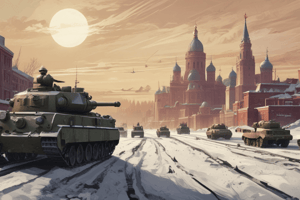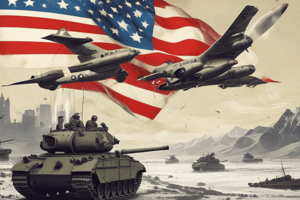Podcast
Questions and Answers
In 1944 delegates from 39 nations met in the city of ___________________________ to discuss a new organization called the ____________________________.
In 1944 delegates from 39 nations met in the city of ___________________________ to discuss a new organization called the ____________________________.
Washington DC; United Nations
Who became the first chair of the Commission on ____________________?
Who became the first chair of the Commission on ____________________?
Eleanor Roosevelt
When the Soviet Union liberated ____________________ in 1944, they encouraged the establishment of a ____________________ government.
When the Soviet Union liberated ____________________ in 1944, they encouraged the establishment of a ____________________ government.
Poland; communist
The leaders issued the Declaration of Liberated Europe that asserted all nations have the right to __________________________________________________________________________________________.
The leaders issued the Declaration of Liberated Europe that asserted all nations have the right to __________________________________________________________________________________________.
The Allies divided Germany into __________ zones, each one controlled by one Allied nation.
The Allies divided Germany into __________ zones, each one controlled by one Allied nation.
Tension between the United States and the Soviet Union led to the __________________________.
Tension between the United States and the Soviet Union led to the __________________________.
In July 1945 Truman and Stalin met at the ___________________________.
In July 1945 Truman and Stalin met at the ___________________________.
The Soviets refused to uphold the ________________________________________.
The Soviets refused to uphold the ________________________________________.
Flashcards are hidden until you start studying
Study Notes
Origins of the Cold War
- In 1944, delegates from 39 nations convened in Washington D.C. to establish the United Nations, comprising a general assembly and a security council.
Human Rights Commission
- A Commission on Human Rights was formed shortly after, with Eleanor Roosevelt as its first chair.
Polish Government Establishment
- After liberating Poland in 1944, the Soviet Union promoted the formation of a communist government, while the pre-war government relocated to Britain.
- Churchill and Roosevelt agreed to recognize the communist government if it included members of the pre-war government, and insisted on holding free elections at the earliest opportunity.
Declaration of Liberated Europe
- The Declaration of Liberated Europe affirmed that all nations have the right to choose their form of government.
Division of Germany
- The Allies partitioned Germany into four zones, each administered by an Allied nation, and mandated that Germany pay reparations for the war.
Cold War Tensions
- Rising tensions between the United States and the Soviet Union marked the onset of the Cold War, rooted in differing economic ideologies; the Soviets embraced communism, while U.S. leaders advocated capitalism as essential for peace.
Potsdam Conference
- At the Potsdam Conference in July 1945, Truman emphasized the necessity for industry in Germany, opposing the Soviet view, which prioritized reparations.
Eastern Europe and the Iron Curtain
- The Soviets disregarded the Declaration of Liberated Europe, leading Eastern European nations to establish communist governments, collectively referred to as satellite nations.
- Churchill famously described the divide between Eastern and Western Europe as the "Iron Curtain."
Studying That Suits You
Use AI to generate personalized quizzes and flashcards to suit your learning preferences.




